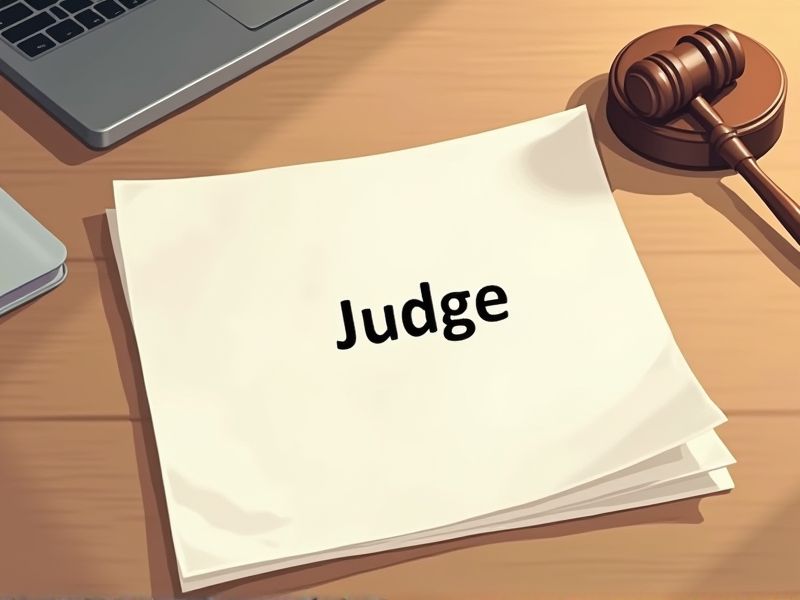
A judge's role involves complex decision-making, requiring both legal knowledge and ethical understanding. Without certain certifications, a judge may lack the structured training necessary to handle the intricacies of law and courtroom management effectively. Certified judges demonstrate a commitment to maintaining legal standards and upholding justice. Here are some important certifications that may be needed for a judge.
State Bar Admission Certification
State Bar Admission Certification ensures that a judge possesses a comprehensive knowledge of the law and legal procedures, stemming from the standardized regulatory requirements it mandates. This certification verifies an individual's competence and ethical standards, which are fundamental to maintaining public trust and integrity within the judiciary system. It acts as a legal confirmation that the judge has met specific professional qualifications necessary to interpret and apply the law effectively. Furthermore, it serves as an accountability measure, subjecting judges to continuous professional development and adherence to evolving legal standards.
Judicial Officer Certification Program
The Judicial Officer Certification Program ensures judges have up-to-date knowledge of evolving laws and legal standards, enhancing their capacity to deliver just rulings. It mandates continuous education, reducing the risk of judicial errors related to outdated knowledge. Certification instills public confidence, as it demonstrates a judge's commitment to maintaining professionalism and competence. The program fosters consistency across judicial practices, promoting fair and equitable treatment in the judicial process.
Judicial Ethics Certification
Judicial Ethics Certification ensures judges adhere to established ethical standards, reinforcing public trust in the judicial system. This certification reduces incidences of bias or misconduct, maintaining the integrity and impartiality necessary for fair decision-making. The certification process educates judges on current ethical guidelines, facilitating consistency across different courts. It addresses potential ethical dilemmas proactively, mitigating risks associated with legal misinterpretations or conflicts of interest.
Alternative Dispute Resolution Certification
Certification in Alternative Dispute Resolution (ADR) provides judges with skills to facilitate negotiations and mediate conflicts efficiently. It enhances their ability to resolve disputes outside traditional courtroom procedures, often resulting in time and cost savings. With ADR expertise, judges can better manage caseloads, reducing the burden on the judicial system. ADR training equips judges to handle complex cases more adaptively, fostering fair outcomes with less adversarial impact.
Mediation Certification
Judges with mediation certification are better equipped to facilitate negotiations, which often leads to more efficient conflict resolution. This certification provides judges with advanced skills in communication and problem-solving, enhancing their ability to manage complex disputes. Data indicates that cases involving certified mediators tend to have higher settlement rates, potentially reducing court dockets and resource allocation. Certified judges can also help litigants reach amicable resolutions, fostering fair and satisfactory outcomes for all parties involved.
Continuing Judicial Education Certificate
Judicial education ensures that judges remain well-versed in current laws and legal precedents, which allows for more accurate rulings. Earning a Continuing Judicial Education Certificate can enhance a judge's understanding of evolving legal complexities, contributing to improved decision-making. The certificate program reinforces a commitment to ethical standards and professionalism, serving to maintain public confidence in the legal system. It also provides a structured platform for judges to exchange knowledge and experiences, fostering a more cohesive judicial community.
Advanced Legal Research Certification
The complexity and volume of legal information require judges to have advanced skills for efficient and accurate decision-making. Enhanced legal research certification equips judges with the necessary tools to navigate vast databases, ensuring they are informed by the most current legal precedents and statutes. With the rapid evolution of laws, continuous training allows judges to maintain a deep understanding of emerging legal issues. Effective legal research minimizes errors in judgments, promoting fairness and justice in the judicial process.
Criminal Law Certification
Criminal Law Certification equips judges with specialized knowledge, which enables them to make informed decisions on complex criminal cases. A certified understanding helps to ensure fair trial proceedings and protect defendants' legal rights effectively. Such certification also enhances public trust in the judiciary by demonstrating a judge's expertise and commitment to the justice system. Continuous legal education through certification keeps judges updated on new laws and legal precedents, improving court efficiency.
Civil Litigation Certification
Civil Litigation Certification enhances a judge's legal proficiency and understanding of complex case law, leading to informed rulings. Certification ensures that judges possess the necessary skills to manage court proceedings effectively, reducing errors and appeals. A certified judge demonstrates a commitment to continuous legal education, promoting public trust in the judicial system. Credibility and expertise fortified by certification can expedite the resolution process, benefiting both the court system and litigants.
Cyberlaw and Data Privacy Certification
Judges increasingly encounter digital evidence and tech-driven cases, and a Cyberlaw and Data Privacy Certification equips them with the necessary understanding of complex digital issues. The exponential rise in cybercrimes necessitates specialized knowledge to effectively adjudicate and interpret relevant laws. Awareness of data privacy concerns ensures judges can protect individuals' rights while balancing legal interests. As technology rapidly evolves, possessing this specialized certification keeps judges current with new legal challenges in the digital realm.
Summary
When you observe a judge acquiring certifications, you might anticipate enhanced decision-making skills. These certifications often bring a deeper understanding of specific legal areas, potentially leading to more informed judgments. Judges with additional certifications may also gain increased credibility and respect within the legal community. As a consequence, public confidence in the judicial process can be strengthened.
